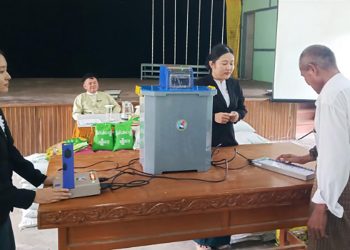Myanmar’s military regime has extended emergency rule for another six months, a tacit admission that its coup has failed.
On Sunday, the regime summoned a meeting of the National Defense and Security Council (NDSC), the highest authority in Myanmar.
Under the 2008 military-drafted constitution, the chief of the Myanmar military can order a state of emergency for one year and then renew the order twice more for a period of six months each time.
The latest extension means the state of emergency will last for at least two years, a sign that coup leader Senior General Min Aung Hlaing has failed to restore normalcy to the country.
Last February, the military seized power in a coup, justifying its power grab by alleging massive voter fraud in the 2020 general election which Daw Aung San Suu Kyi’s National League for Democracy (NLD) Party won in a landslide.
Min Aung Hlaing’s laughable statistics
Min Aung Hlaing told the NDSC meeting that there have been over 7,000 mine blasts, 6,000 attacks and 1,000 arson attacks by the parallel National Unity Government and its armed wing, the People’s Defense Forces, in the 18 months since the putsch.
If those figures are regarded as true, it shows that the military, which swallows up the lion’s share of the country’s annual budget, is disproportionately weak.
Sagaing Region saw the most resistance activity with over 4,000 attacks, according to the junta boss, while Yangon saw nearly 2,500 attacks, Mandalay over 2,000 attacks and Magwe over 1,300 attacks. Stability has yet to be restored in those regions.
Over 3,000 civil servants, including administrative staff as well as junta supporters, have been killed since the coup and around 3,000 more injured, said Min Aung Hlaing. It appears that he has included slain members and supporters of the military’s proxy Union Solidarity and Development Party (USDP) in those figures. When UDSP Chair U Than Htay met the Association of Southeast Asian Nations Special Envoy on Myanmar last month, he told him that more than 1,800 USDP members had been killed by anti-regime forces.
But Min Aung Hlaing made no mention of the air and artillery strikes, arbitrary killings and arson attacks carried out by his soldiers.
More than 2,000 people have died at the hands of the junta, according to the Assistance Association for Political Prisoners, and some 15,000 have been detained since the coup.
Across the country, over 1.2 million people are currently displaced, including nearly 866,400 people displaced by the conflict since the military takeover, said the United Nations Office for the Coordination of Humanitarian Affairs in Myanmar.
The coup leader made himself a laughing stock as he told the NDSC meeting that Myanmar has run a US$1 billion trade surplus under his rule. Myanmar is dependent on imports and has always run a trade deficit under successive governments. Thanks to Min Aung Hlaing’s wild monetary policies, Myanmar is now facing a severe shortage of US dollars and Myanmar’s currency the kyat has slumped against the greenback, with the exchange rate hitting around 2,800 kyats to a dollar in the open market now.
Sham NDSC, sham election
After reading out those statistics at the NDSC meeting, Min Aung Hlaing proposed extending military rule for another six months and the country’s acting president U Myint Swe, a former Lieutenant General, nodded in agreement.
Since the coup, the nominal president has only appeared in public three times, when Min Aung Hlaing held three NDSC meetings to declare and renew the state of emergency in an effort to pretend that the coup is in accordance with law.
Another person who has only appeared at NDSC meetings is former Lower House speaker T Khun Myat. He has been involved in politics since the 2008 constitution was drafted, and will go down in Myanmar history as a politician who cares only about keeping his seat in parliament, regardless of the country’s situation under successive governments, whether Senior General Than Shwe’s former junta, U Thein Sein’s quasi-civilian government, Daw Aung San Suu Kyi’s NLD government or the current regime.
All the other NDSC members are generals. Even the foreign minister, which is supposed to be a civilian position in the NDSC, is a former colonel. So the meeting was just a sham to fool people into believing that emergency rule was extended in accordance with law.
Also a sham is the proposed election that the regime has promised to hold in August next year. Few people believe that any poll staged by the junta will be free and fair.
The regime has appointed U Thein Soe as the chairman of Union Election Commission to oversee the upcoming election. The former Major General previously oversaw the 2010 general election, which is widely believed to have been rigged in favor of the USDP.
The NLD, which enjoys overwhelming popular support in Myanmar, has said that it will boycott the proposed junta-organized election.
As the regime is planning to introduce proportional representation in the upcoming election, it will need time to educate voters about the new system and, even in normal times, one year is not enough time to do that, said observers.
At the NDSC meeting, Min Aung Hlaing said that the Myanmar military will serve as the guardian of the country. Acting President U Myint Swe also asked the military to serve as the guardian for the country’s interests.
Min Aung Hlaing has denied staging a coup, and has insisted instead that the Myanmar military is only playing the role of an interim government under the constitution until the next election. His lie will soon be exposed as, according to the constitution, no military chief can hold power under emergency rule for more than two years.

















